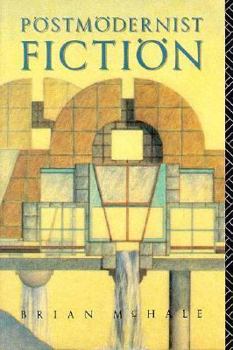Postmodernist Fiction
Select Format
Select Condition 
Book Overview
In this trenchant and lively study Brian McHale undertakes to construct a version of postmodernist fiction which encompasses forms as wide-ranging as North American metafiction, Latin American magic realism, the French New New Novel, concrete prose and science fiction. Considering a variety of theoretical approaches including those of Ingarden, Eco, Dolezel, Pavel, and Hrushovski, McHale shows that the common denominator is postmodernist fiction's...
Format:Paperback
Language:English
ISBN:0415045134
ISBN13:9780415045131
Release Date:July 1987
Publisher:Routledge
Length:278 Pages
Weight:0.96 lbs.
Dimensions:0.9" x 6.1" x 9.2"
Customer Reviews
3 ratings
Applied literary postmodernism
Published by Thriftbooks.com User , 20 years ago
How refreshing!! Unlike so many literary theorists who rarely if ever cite a work of literature, McHale actually reads books and applies his theories to them. If you ask me, any literary postmodernist who doesn't talk about an author like Pynchon is missing the point. This is one of the best examples of applied postmodern theory I've ever read. And full of remarkable insights (like his discussion of modernism/mystery and postmodernism/sci fi). If you're interested in what postmodernism is in literature, this should be the first book you read (after one of the fun, easy guides like "Postmodernism for Beginners"). Highly recommended.
As Good as It Gets
Published by Thriftbooks.com User , 25 years ago
No one has ever been able to place a great contemporary within a set framework, or at least not until they (the great contemporaries) finally fit the framework, in a way that suited the scheme of the critics of the time, or were well out of the way and hence harmless in the sense of further complicating the matter. Most of the literary criticism frameworks provided so far (20th century-wise) have been non-rigid and quite self-abating, but few are as analytical and as erudite as this. Read it; you may learn.
A Useful, Easily Understood Analysis of Postmod Literature
Published by Thriftbooks.com User , 26 years ago
The one definable quality of postmodern literature is its resistance to definitions. Any survey of the criticism done in this field will turn up a huge number of "central characteristics," some of which seem contradictory, others of which are just plain impossible to wrap your mind around. McHale, like so many of his colleagues, does attempt a "paradigm" of postmodernism, but his at least has the advantage of being easy to grasp. Using the idea of the literary "dominant" as set forth by the narratologist/linguist Roman Jakobson, McHale argues that postmodernism in general "foregrounds" ontological issues (questions of being), as opposed to modernist writing, which foregrounds epistemological issues (questions of the nature and limits of knowledge). For example, a novel such as Carlos Fuentes' Terra Nostra is deeply postmodern to the extent that it disrupts time and space (factors that determine the nature of being) by gathering together various literary and historical figures in one place for "transtemporal feasts." A high-modernist book such as Joyce's Ulysses, on the other hand, concerns itself more with the nature of knowing: how people think, how information is created and transmitted, what discourses influence our thought and perceptions of the world, and so on. Obviously, this paradigm isn't perfect: seldom is fiction exclusively epistemological or ontological in emphasis, leaving the critic to make the highly subjective decision over which concern is foregrounded in any particular work. Nevertheless, McHale does a good job of accounting for "problem cases," explaining how texts can approach the condition of postmodernism but remain in a state of indecision (McHale classifies such texts as "limit-modernist" and offers a number of examples). Thus, even if it fails as a sure-fire way to distinguish postmodernist fish from modernist fowl, McHale's book offers a new way of looking at texts familiar to fans of both literary movements, which alone makes it a valuable addition to any library. Among the authors whose work is analyzed are Thomas Pynchon, Carlos Fuentes, Samuel Beckett, John Barth and Vladimir Nabokov, to name only a few.






